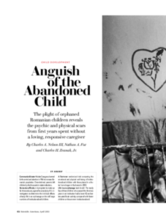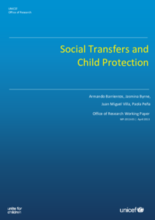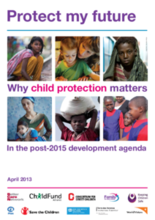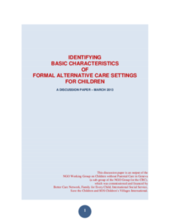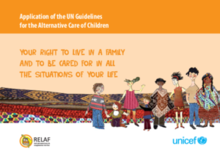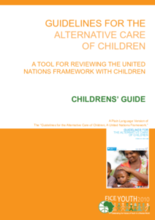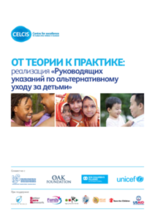Displaying 3701 - 3710 of 4420
Published in Scientific American in 2013, this article describes the findings from the first-ever randomized trial comparing the emotional and physical well-being of institutionalized children with those placed in foster care in Bucharest, Romania.
This study, published by the UNICEF Office of Research and Brooks World Poverty Institute, examines the direct, indirect, and implementation impacts of social transfers on child protection outcomes in low- and middle-income countries. The paper discusses the ways in which social transfers can promote the welfare of children by preventing violence, abuse, and exploitation of children and offers recommendations for future research, programming, and practice.
This paper is the culmination of a series of inter-agency papers on the links between child protection and major development goals, designed to feed into the thematic debates around the post-2015 development framework.
Ces dernières années, l’adoption internationale a petit à petit perdu du terrain suite à des scandales à répétition liés à des cas d’abus, de trafic et de traite d’enfants. La pression de la communauté internationale notamment des pays d’accueil a porté ses fruits et contraint des Etats d’origine à revoir leur fonctionnement, leur législation et leurs procédures.
The discussion paper provides an overview of existing definitions of formal care within the UN Guidelines and a summary of the basic characteristics identified for each, together with explanations for the proposed characteristics.
This article discusses the use of standard household surveys as measurement of progress toward development goals, which by design omit the most marginalized groups from data collection.
This RELAF booklet, Application of the UN Guidelines for the Alternative Care of Children, is a child-friendly guide to the Guidelines of for the Alternative Care of Children meant for children and adolescents to inform them of their right to live with their families and make that right a reality.
This booklet from SOS Children’s Villages International was created for young people to explain in a simple manner the main points of the Guidelines for the Alternative Care of Children approved by the United Nations General Assembly in 2009. The booklet helps its young audience think about the principles of alternative care and what these mean for children and families in different situations.
Dans un contexte en évolution, Terre des hommes ne servira plus d’intermédiaire en adoption mais continuera de plaider pour la protection de l’enfant, en favorisant le maintien ou le retour des enfants dans leur famille ou le recours à des prises en charge alternatives comme les familles d’accueil dans les pays d’origine des enfants.
This handbook (in Russian) is designed as a tool for legislators, policy-makers, and all professionals and care providers to support the implementation of the Guidelines for the Alternative Care of Children, endorsed by the United Nations General Assembly in 2009.

